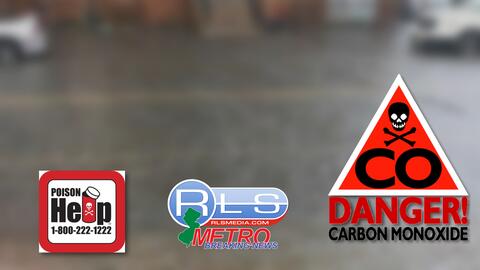By: Richard L. Smith
As forecasters prepare residents for a heavy rain storm expected to result in a drastic drop in temperatures beginning today (Thursday), NJ Poison Control Center officials are also alerting residents of the potential for carbon monoxide poisoning while using specific gas-powered equipment.
Beginning this afternoon, officials said dangerous weather will bring heavy rain, intense/damaging winds, flash flooding, and power outages.
Many people use gas generators to keep their power on.
According to the NJ Poison Control center, gas-powered equipment, including generators, pressure washers, grills, camping stoves, and vehicles, produce deadly carbon monoxide and should never be used indoors.
Officials say to prevent carbon monoxide poisoning, keep gas generators outdoors more than 20 feet away from your home and your neighbors’ homes — including doors, windows, and vents.
“Carbon monoxide gas is deadly and people are often exposed to it during and after intense storms like we had last night,” says Bruce Ruck, managing director of the New Jersey Poison Control Center at Rutgers New Jersey Medical School.
“Carbon monoxide gas gives no warning, which is why it’s important to have working detectors in your home. Listen to your CO detector if it sounds its alarm; it’s trying to save your life.”
NJ Poison Control Center officials urge residents to recognize the signs and symptoms of carbon monoxide poisoning and act quickly.
Early symptoms of CO poisoning can be confused with symptoms of viral illnesses like the common cold, seasonal flu, and COVID-19 (headache, dizziness, weakness, upset stomach, vomiting, chest pain, and confusion).
Officials say it is unsafe to idle your car in the garage even with the garage door open. If you need to charge your phone, pull your vehicle completely out of the garage with the tailpipe/exhaust facing away from the home.
Dangerous levels of CO can build up quickly in your home, apartment, or vehicle, poisoning those inside, including pets.
“Every minute counts in situations involving carbon monoxide gas,” says Ruck.
“Call the poison center if you think you or someone was exposed to carbon monoxide, 1-800-222-1222.
If someone is not breathing, is hard to wake up, or having a seizure, call 9-1-1.”
If you suspect carbon monoxide poisoning, get help immediately:
- If someone is unconscious or unresponsive, get them out of the house and call 9-1-1 immediately.
- Leave the house or building right away. Do not waste time opening windows. This will delay your escape and cause you to breathe in even more dangerous fumes.
- Contact your local fire department or energy provider.
- Call the NJ Poison Control Center at 1-800-222-1222 for immediate treatment advice. Do not waste time looking for information on the internet about carbon monoxide poisoning. Call the poison center for fast, free, and accurate information.
Safety tips to help reduce your risk of carbon monoxide exposure during storms:
- Generators should only be used outside.
- Keep generators more than 20 feet from both your home and your neighbors’ homes. This includes keeping generators away from doors, windows, and vents. Generator Safety Tips
- Use pressure washers, grills, camp stoves, or other gasoline, propane, natural gas, or charcoal-burning devices outdoors only. Using them inside your home, basement, garage, carport, camper, boat cabin, or tent is never safe.
Indoors
- Carbon monoxide detectors should be on every level of your home, including near sleeping areas.
- Check to make sure your CO detectors are working. If detectors are old or not working correctly, replace them.
- Keeping a car running in a garage is extremely dangerous. Carbon monoxide gas can quickly build up inside the garage even with the garage door open.
- Be careful with “remote start” engines that may turn on without you knowing.
Contact your local poison control center immediately if someone is exposed to carbon monoxide.
NJ Poison Control Center officials said medical specialists are available to provide information, answer questions, and provide emergency support 24 hours a day.
Anyone can call for medical help – children, teens, and adults. Poison control centers are a medical resource for both the public and healthcare providers.
Call the NJ Poison Control Center at 1-800-222-1222 or Chat Here.
If someone is not breathing, hard to wake up, or having a seizure, call 9-1-1
